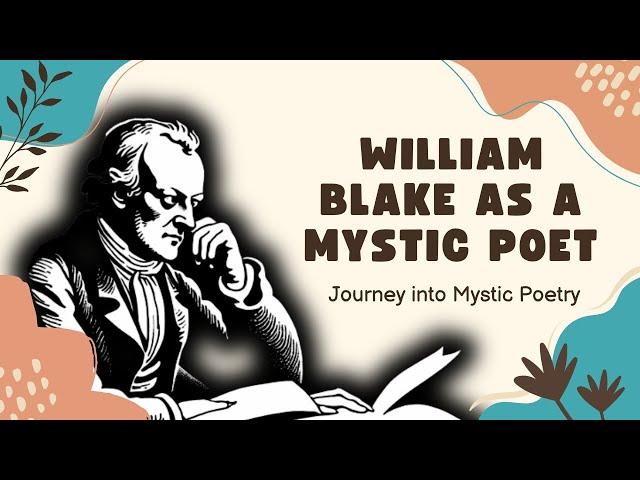
William Blake as a Mystic Poet: A Journey into Mystic Poetry
Blake's poetry searches for metaphysical and spiritual realms. It explores themes of divine vision, the nature of God, the soul's journey as well as a relationship between the material and spiritual worlds. His poetry often contains vivid imagery and complex symbolism that reflect his mystical insights and experiences.
What is a Mystic Poet?
A poet who writes poetry exploring themes of spirituality, mysticism and a deep connection with the divine is called a mystic poet. Mystic poets see beyond the material world.
Characteristics of Mystical Poetry.
Symbolism and Imagery.
Intense Emotion.
Union with the Divine.
Inner Journey and Self-Exploration.
Non-Dualism.
Is William Blake a Mystic Poet?
William Blake's poetry is deeply rooted in his mystical beliefs and experiences. Indeed, it makes him a significant figure in the realm of mystic poetry. Let us find out whether Blake's poetry contains the above-said ingredients of mystical poetry or not.
Symbolism and Imagery.
William Blake uses deep symbols and mystical elements in his poetry. He does this to explore themes of spirituality, the human condition and the nature of reality. He mixes symbolism and imagery to convey his mystical and spiritual experiences.
In many of his poems, the poet William Blake presents a mystic perspective that goes beyond the limits of the physical world. In his famous poems "The Tyger" and "The Lamb," he uses contrasting imagery to represent the divine and spiritual dimensions.
Intense Emotion.
William Blake explores deep human emotions. Two of his most famous collections, "Songs of Innocence and Experience" and "The Marriage of Heaven and Hell," are worth mentioning in this regard. These two collections contain intense emotional engagement with mysticism.
The poet emphasizes the importance of pushing boundaries and exploring one's desires. He conveys the idea that the rules of society are obstructions on the path to mysticism.
Hence, William Blake's poetry is marked by its intense emotions. In particular, he explores mysticism in his poetry.
Union with the Divine.
The mystic poet William adopts a unique and deeply spiritual approach to poetry. His poetry is often categorized as mystical due to its exploration of metaphysical and spiritual realms. Blake's concept of union with the Divine can be understood through his mystical poetry. He delves into themes of spiritual transformation and the transcendence of the material world.
His poems often create pen pictures of angels, spirits and divine beings. These visions are central to William Blake's mystic poetry and reflect the poet's personal quest for spiritual understanding and union.
Inner Journey and Self-Exploration.
The poetry of William Blak delves into themes of inner journey, self-exploration and mystical experiences. His poetry often emphasizes the idea that there are deeper truths and realities beyond the surface of everyday life.
The poem "The Sick Rose" by William Blake presents a juxtaposition of beauty and decay. The poem reflects on the complexities of love, desire and vulnerability. The poet says that there is something within ourselves that causes destruction but we are unable to tell this to others.
In this way, William Blake's poetry is full of themes of inner journey, self-exploration and mystical experiences.
Non-Dualism.
Non-dualism is a philosophical and spiritual perspective. Non-dualism is a way of thinking that says things are not just black or white, good or bad but they can also be both at the same time. For example, a coin has two sides but it is still one coin. In non-dualism, there's an idea that everything is connected, and the boundaries between things are not as clear as they might seem. It's about seeing the unity in everything, rather than just focusing on differences.
Indeed, Blak's works often explore themes of spirituality and mysticism. This concept aligns closely with non-dualism. Blake's poetry can be seen as reflecting non-dualistic concepts in several ways.
Conclusion.
The poet William Blake's mystic poetry is rich in symbolism and vivid imagery. The poet intertwines the realms of intense emotion and spiritual exploration. Blake delves into the depths of human experience through his verses. His poetry often leads the reader on an inner journey, where the physical and spiritual realms merge. The poet illuminates the concept of union with the divine. Blake's exploration of non-dualism is evident in that he explores the depths of the human psyche and makes its connection with the divine.
00:00 - Introduction
00:21 - What is a Mystic Poet?
00:36 - Characteristics of Mystical Poetry
00:51 - Is William Blake a Mystic Poet?
01:11 - Symbolism and Imagery
01:58 - Intense Emotion
02:40 - Union with the Divine
03:21 - Inner Journey and Self-Exploration
04:20 - Non-Dualism
05:08 - Conclusion
What is a Mystic Poet?
A poet who writes poetry exploring themes of spirituality, mysticism and a deep connection with the divine is called a mystic poet. Mystic poets see beyond the material world.
Characteristics of Mystical Poetry.
Symbolism and Imagery.
Intense Emotion.
Union with the Divine.
Inner Journey and Self-Exploration.
Non-Dualism.
Is William Blake a Mystic Poet?
William Blake's poetry is deeply rooted in his mystical beliefs and experiences. Indeed, it makes him a significant figure in the realm of mystic poetry. Let us find out whether Blake's poetry contains the above-said ingredients of mystical poetry or not.
Symbolism and Imagery.
William Blake uses deep symbols and mystical elements in his poetry. He does this to explore themes of spirituality, the human condition and the nature of reality. He mixes symbolism and imagery to convey his mystical and spiritual experiences.
In many of his poems, the poet William Blake presents a mystic perspective that goes beyond the limits of the physical world. In his famous poems "The Tyger" and "The Lamb," he uses contrasting imagery to represent the divine and spiritual dimensions.
Intense Emotion.
William Blake explores deep human emotions. Two of his most famous collections, "Songs of Innocence and Experience" and "The Marriage of Heaven and Hell," are worth mentioning in this regard. These two collections contain intense emotional engagement with mysticism.
The poet emphasizes the importance of pushing boundaries and exploring one's desires. He conveys the idea that the rules of society are obstructions on the path to mysticism.
Hence, William Blake's poetry is marked by its intense emotions. In particular, he explores mysticism in his poetry.
Union with the Divine.
The mystic poet William adopts a unique and deeply spiritual approach to poetry. His poetry is often categorized as mystical due to its exploration of metaphysical and spiritual realms. Blake's concept of union with the Divine can be understood through his mystical poetry. He delves into themes of spiritual transformation and the transcendence of the material world.
His poems often create pen pictures of angels, spirits and divine beings. These visions are central to William Blake's mystic poetry and reflect the poet's personal quest for spiritual understanding and union.
Inner Journey and Self-Exploration.
The poetry of William Blak delves into themes of inner journey, self-exploration and mystical experiences. His poetry often emphasizes the idea that there are deeper truths and realities beyond the surface of everyday life.
The poem "The Sick Rose" by William Blake presents a juxtaposition of beauty and decay. The poem reflects on the complexities of love, desire and vulnerability. The poet says that there is something within ourselves that causes destruction but we are unable to tell this to others.
In this way, William Blake's poetry is full of themes of inner journey, self-exploration and mystical experiences.
Non-Dualism.
Non-dualism is a philosophical and spiritual perspective. Non-dualism is a way of thinking that says things are not just black or white, good or bad but they can also be both at the same time. For example, a coin has two sides but it is still one coin. In non-dualism, there's an idea that everything is connected, and the boundaries between things are not as clear as they might seem. It's about seeing the unity in everything, rather than just focusing on differences.
Indeed, Blak's works often explore themes of spirituality and mysticism. This concept aligns closely with non-dualism. Blake's poetry can be seen as reflecting non-dualistic concepts in several ways.
Conclusion.
The poet William Blake's mystic poetry is rich in symbolism and vivid imagery. The poet intertwines the realms of intense emotion and spiritual exploration. Blake delves into the depths of human experience through his verses. His poetry often leads the reader on an inner journey, where the physical and spiritual realms merge. The poet illuminates the concept of union with the divine. Blake's exploration of non-dualism is evident in that he explores the depths of the human psyche and makes its connection with the divine.
00:00 - Introduction
00:21 - What is a Mystic Poet?
00:36 - Characteristics of Mystical Poetry
00:51 - Is William Blake a Mystic Poet?
01:11 - Symbolism and Imagery
01:58 - Intense Emotion
02:40 - Union with the Divine
03:21 - Inner Journey and Self-Exploration
04:20 - Non-Dualism
05:08 - Conclusion
Тэги:
#blake_as_a_mystic_poet #william_blake_as_a_mystic_poet #william_blake_as_a_visionary_and_mystic_poet #william_blake_as_a_romantic_poet #william_blake_as_a_modern_poet #william_blake_as_a_symbolic_poet #william_blake_metaphysical_poetry #characteristics_of_william_blake_poetryКомментарии:
I Am Here by Marvin Halili Rivera - Live from Synth Heart Studio
Synth Heart Studio
None Nedelkovska - Najdi malku vreme
Sasa Saric
Güncel Gürsel Artıktay - Bu Yüzden
Güncel Gürsel Artıktay



















